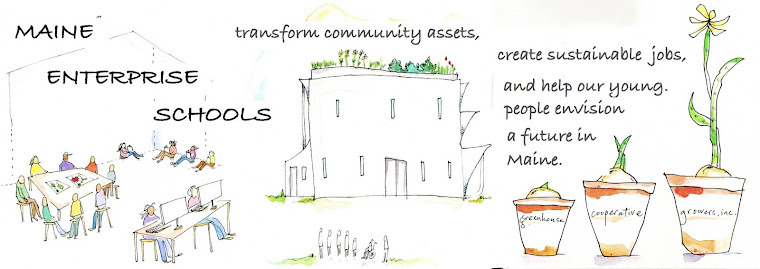In each community we work in, one or more local non-profits (an educational farm, land trust, or social service agency) is a partner. We're working on formal partnership agreements with:
- Learning Works and Jobs For Maine Graduates to integrate our effective educational interventions as MES sites.
- Maine Centers for Women, Work and Community, MOFGA, Maine Businesses for Sustainability and Slow Money Maine to link our enterprise partners to existing and new business development, planning and funding capacities.
- Cultivating Community and FARMS (Focus on Agriculture in Rural Maine Schools) to create sustainable food systems for local school districts.
- Boothbay Railway Village and Museum to become one of several MidCoast sites where our the economic and cultural activity generated by our students and enterprises, help the Railway Village's existing educational mission become more sustainable.
- Bath Regional Career and Technical Institute, which serves 4 school districts (RSU 1 in Bath, Sheepscot Valley RSU, Boothbay Region Schools, and AOS 93/Central Lincoln County Schools.
- MSAD 51 in Cumberland/North Yarmouth, with the potential of serving neighboring districts such as Portland, Yarmouth, Falmouth, and Gray/New Gloucester.
- We have active "phase two" conversations underway in communities from Lewiston/Auburn to Washington County to Greenville, with the expectation of adding 2-3 sites a year for the next several years.
- Rosemont Markets and Bakery is working with MES to create markets and distribution for value added food products produced by our farmer and non-profit partners.
- Knickerbocker Group, Midnight Oil and MidCoast Energy Systems in the MidCoast and ReVision Energy in the Portland area are potential partners in Green Energy and Design incubators that not only develop low-cost energy solutions, but train the next generation of workers those businesses will need.
- Portland furniture maker Furniturea and Hallowell textile manufacturer Brahms-Mount are among the Creative Economy companies working to develop "local first" supply chains for raw materials. With partners like these as well as individual artists and craftspeople, Maine Enterprise Schools sites will function as producer and marketing coops - not only reducing obstacles to micro-business start-up, but enabling artists and artisans to teach, exhibit, and perform as part of a community.
